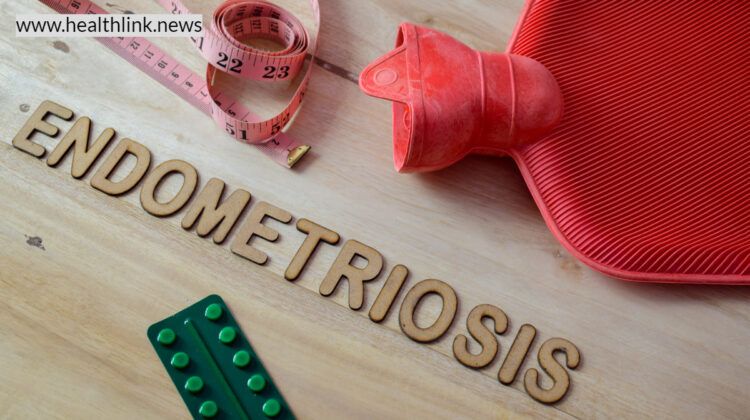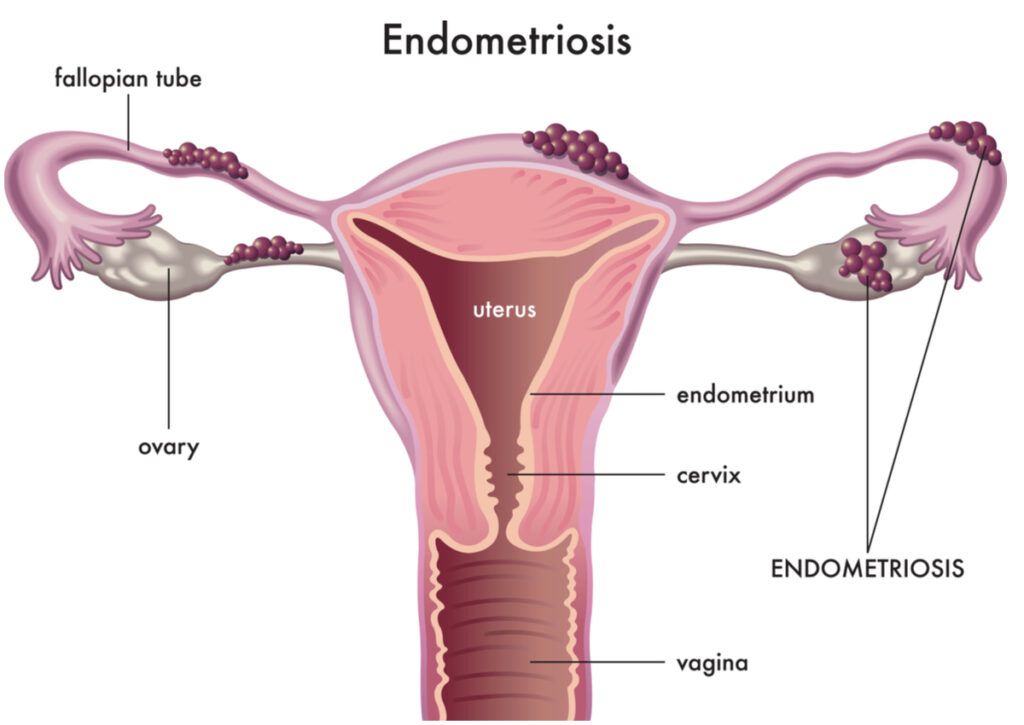Pregnancy with Endometriosis: Learn About the Risks

Endometriosis and Pregnancy
Endometriosis is a dangerous condition of the uterus that can harmfully affect pregnancy. Before you are planning to get pregnant, it is very important to get a clear idea of what endometriosis is all about and how it can cause difficulties in your pregnancy. If not treated properly or early after noticing it, endometriosis can not only affect your pregnancy, but can also create serious disorders in your overall health system, and can also lead to the elimination of the uterus and ovary through surgery.
What is Endometriosis?

Endometriosis is a common disorder related to the uterus and the ovary. Such a condition develops, when some tissues similar to those that are present in the inner lining of the uterus, known as endometrium, grow outside the uterus and spreads to other organs nearby like the bladder, ovaries, or in the fallopian tubes. The tissues that develop during endometriosis, act like regular endometrial tissues in the lining of the uterus that sheds with menstrual blood but they break later and bleed at the end of a particular period cycle and thus the surroundings become abnormally swollen due to possible scars or lesions. Endometriosis is an abnormal condition that badly disrupts your reproductive functions and abilities, so it is very important to get it treated before you start planning for a pregnancy. If you plan pregnancy with endometriosis in your ovaries, it is likely to affect the health of your baby and can also cause miscarriage or stillbirth.
Types of Endometrioses:
There are various types of endometriosis and their intensity differs from one woman to another. Broadly, endometriosis can be divided into three types. Those are listed here as:
- Superficial peritoneal lesion: The most widely found form of endometriosis is a superficial peritoneal lesion that appears mainly in the pelvic cavity.
- Deeply infiltrating endometriosis: This type of endometriosis is often found to grow around other organs near to the uterus, such as your bowels or bladder.
- Endometrioma: Also known as an ovarian lesion, it occurs in the ovaries in the form of dark, rounded cysts that remain filled with fluid-like liquids.
Symptoms related to Endometriosis:
In the early stage of endometriosis, there is no significant or noticeable symptom in your body. But as the disorder spreads and increase in intensity, you might experience the following symptoms:
- Severe cramps and pain in the stomach and the back during your periods.
- Pain in the genitals during excretion, urination, and menstruation, characterized by heavy pain and cramps in the lower abdomen and the lower back with an unusual and excessive bleeding.
- Slight traces of blood in stool or urine.
- Diarrhea or constipation.
- Excessive tiredness and feeling of exhaustion.
- Difficulty to achieve pregnancy.
- Pain during intercourse.
The above symptoms do not always necessarily point to underlying ovarian endometriosis and can develop in your body may be due to some other health issues. But once you start noticing these symptoms, try to consult a health care surgeon at once.
Endometriosis Complications
When endometriosis becomes a harmful issue, it potentially affects your reproductive health and disrupts your natural functions with excessive and unbearable pains that lead to psychological disorders too, including anxiety, clinical depression, or several types of stress disorders.
Complications related to endometriosis include chances of developing ovarian cancer, breast cancer, or any other type of cancer called endometriosis-associated Adenocarcinoma. So, it is always advisable to consult your health care expert and get necessary treatments regarding endometriosis and remain in proper check-ups, including proper clinical tests such as mammograms and other necessary steps.
Pregnancy and Endometriosis: The possible treatments
Though getting pregnant can lead to possible side effects and affect the health of both mother and baby, one can get pregnant normally, even if she suffers from endometriosis.
If a woman is suffering from endometriosis, the main problem that occurs is regarding ovulation. So, it is very much recommended to get the gynecologist’s or any other concerned health care expert’s opinions to get endometriosis treated through various processes such as laparoscopic surgeries, or a uterine biopsy. There are also several forms of medications along with surgery that might help treat endometriosis. Once you get endometriosis treated with surgery, you might be able to conceive after full recovery. But for those who are suffering from major stages of the disease, might find it difficult to get pregnant in the later period.
Other forms of treatments of pregnancy with endometriosis:
Apart from these, there are some other treatments of endometriosis too that include external hormonal (that primarily contain estrogen and progesterone) therapy that is done by the intake of pills or with a jab of injections or surgery.
If you demand a safe pregnancy and successful childbirth even while suffering from endometriosis or any other ovarian disorders, try considering the following steps:
- Consult your doctor or your concerned caregiver during your pregnancy to take SOS or over the counter (OTC) medicines such as pain killers
- Maintain a healthy schedule and perform regular workouts within permissible limits, along with yoga and breathing exercises.
- Consume a balanced diet, rich in essential pre-natal vitamins and folic acids or folate as prescribed by your doctor. Consume foods that are rich in fiber to reduce bowel symptoms, proteins, and antioxidants.
- You must positively consume all the medications prescribed by your doctor at proper timings and in correct doses.
Getting pregnant naturally with endometriosis:
There are precisely some key factors that will determine whether you will conceive easily and naturally with endometriosis and whether you will ever be able to conceive. Those two factors are as follows:
1. The intensity and severity of endometriosis that you are suffering from
2. The factors that have nothing to do with this disorder, that is, your age (if it is above 35 and in the 40s when your fertility and chance of getting pregnant gradually start decreasing), the fertility of the father- whether he has an optimum sperm count and other necessary conditions, lifestyle disorders, stress, and anxiety-related problems, healthy diet, and so on.
Can I get pregnant easily with endometriosis?
The matter of getting pregnant with endometriosis is entirely dependent on the matter of how to sever your case is and whether your ovaries that are already suffering from a disorder will be able to take the hustle of a pregnancy. But if you still want to get pregnant, try to cure the disease first and then try for a child. It is advisable to take the help of a professional gynecologist in this case.
Risks pregnancy with endometriosis:
There are some potential downsides of getting pregnant while you are suffering from a severe ovarian disorder like endometriosis. Even if you get pregnant with endometriosis in your reproductive system, it is going to affect both your health and also the health of your child. Successful childbirths by women with severe cases like endometriosis are also very rare because this disease increases the chances of complications and difficulties in cases of childbirth and your overall pregnancy.
Some such complications are listed as follows:
Pre-eclampsia
This has reportedly been found that when women get pregnant with an underlying endometriosis disorder within their uterus, they are at a greater risk of developing abnormalities like pre-eclampsia, which is primarily characterized by symptoms such as extreme pain below the rib cage, sudden and frequent headaches, higher levels of blood pressure, swelling, and problems in vision. Once notified that you are having these symptoms talk to your gynecologist immediately to get pre-eclampsia and endometriosis treated properly and to ensure the health and safety of your body and also your child.
Placenta previa
Recent studies nowadays are revealing that those women who get pregnant with endometriosis are excessively vulnerable to developing disorders like Placenta previa, characterized by mild to heavy vaginal bleeding when the placenta, either partially or entirely covers the cervix and lies at a much lower level to the ovary and the uterus and this condition may lead to miscarriage by putting the life of the child at stake during birth or can also lead to birth difficulties of the mother in case of normal delivery.
Preterm birth
Recent studies and experiments are now showing that if a woman is having a pregnancy with hidden and untreated endometriosis then she is at a greater risk of giving premature birth to her child and can later suffer from various ailments and severe health conditions.
Cesarean delivery
According to recent studies pregnancy with endometriosis significantly increases the chances of undergoing cesarean methods during childbirth, when a baby is forcefully taken out through surgery in the abdomen instead of taking it out through the mother’s vagina.
Miscarriage
Recent research reviews are pointing out the fact that if a mother gets pregnant with any kind of disorder or any other abnormalities in her reproductive system, then there are high chances that the pregnancy might lead to either miscarriages or stillbirths with prior symptoms like pain in the lower back and lower abdomen, excessive bleeding during pregnancy along with cramps, similar to menstrual cramps.
